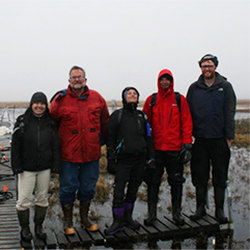Most Influential Scientific Minds
Two SDSU researchers were identified as some of the Worlds Most Influential Scientific Minds by Thomson Reuters.

Walter Oechel and Forest Rohwer, both professors of Biology at San Diego State University, were identified as two of the “World’s Most Influential Scientific Minds” by Thomson Reuters.

Oechel was ranked as a top influencer in the category of Agricultural Sciences for his long standing work on climate change as a plant eco-physiologist and systems ecologist. Rowher was ranked as a top influencer in the category of Microbiology, for his high impact in metagenomics and microbial ecology in natural ecosystems and human health.
“They are the people who are on the cutting edge of their fields,” according to Thomson Reuters. “They are performing and publishing work their peers recognize as vital to the advancement of their science. These researchers are, undoubtedly, among the most influential scientific minds of our time.”
Both in the College of Sciences at SDSU, the two researchers are among some 3,200 individuals who published the greatest number of highly cited papers in one of 21 broad fields from 2002 to 2012.
The distinction was given by analyzing which researchers had the highest number of citations over the past 11 years; data was analyzed using Web of Science and InCites platforms. Thomson Reuters reports highly cited papers rank in the top 1 percent by citations for their field and year of publication.
Areas of Excellence
SDSU’s strategic plan, “Building on Excellence,” builds on the university’s existing strengths focusing on areas that continue to enhance its research and creative endeavors, with particular emphasis on addressing national and international challenges. Both Oechel and Rowher are leaders in two Areas of Excellence identified in the plan: Climate Change and Sustainability Studies and the Viral Information Institute, respectively.

Climate Change and Sustainability Studies provides an opportunity for SDSU to fill the gap in critical interdisciplinary research fields to complement existing expertise and to work toward solving important and pressing climate and sustainability issues.
Faculty and students collaborate across campus and with national and international research groups and institutions including Jet Propulsion Laboratory in Pasadena, Scripps Institution of Oceanography and the University of Sheffield in the United Kingdom to successfully tackle the urgent and challenging climate and sustainability problems faced by human societies at both regional and global scales in the 21st century.
The Viral Information Institute at SDSU studies the interactions between the virosphere and the biosphere, in order to understand how viruses affect all aspects of the biosphere and to be able to manipulate such interactions in order to benefit human health as well as the health of the environment.
The institute is a cross-disciplinary research collective of investigators, combining strengths in genomics, genetics and biochemistry, mathematical modeling and computational analysis. These researchers are committed to discovery-based learning, by providing an environment where students can participate in meaningful independent research projects and by continuing to pursue funding to expand such opportunities.



